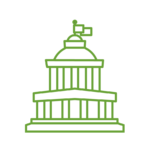U.S. Supreme Court Overturns Chevron Doctrine | Potential Effects on Group Health Plans
Employee Benefits
U.S. Supreme Court Overturns Chevron Doctrine | Potential Effects on Group Health Plans
For approximately 40 years, the Chevron doctrine was in place, requiring courts to give deference to certain federal agencies when interpreting a statute that was vague, ambiguous or silent as to a particular part of the law.
However, the Chevron doctrine was recently challenged under Loper Bright Enterprises v. Raimondo by commercial fishing groups that alleged the federal regulation that requires fishing vessels to pay the salaries of required observers on board was unconstitutional. Many lower courts sided with the federal agency, upholding the regulation under the Chevron doctrine. The U.S. Supreme Court ultimately heard the case, and in a 6-3 decision overturned the well-established Chevron doctrine. This decision would allow courts to independently interpret the law when Congress’ statutes are vague, ambiguous or silent, rather than the courts giving deference to the federal agency interpretation of those congressional statutes.
Federal agency guidance may still be relied upon after the Chevron case was overturned, but if a party in court challenges the interpretation of the federal regulation, the court should independently decide the meaning of the statute passed by Congress (i.e., not give deference to the federal agency’s interpretation). Most likely, these independent court decisions will apply in situations where Congress has not delegated within the statute authority to a federal agency to interpret such statute. This decision, therefore, causes some uncertainty regarding the ability of plan sponsors to rely on current and future federal regulations.
The specific impact of this decision on health and welfare plans has yet to be seen, although some cases challenging existing benefit plan regulations have already been filed. This decision could impact rules set forth by the Department of Labor (DOL), Equal Employment Opportunity Commission (EEOC), Internal Revenue Service (IRS), Centers for Medicare and Medicaid Services (CMS), and Health and Human Services (HHS), including regulations issued under the ACA and regulations impacting wellness programs.
At this time, there are no specific actions for employers to take due to the Supreme Court’s overturning of the Chevron doctrine. However, employers sponsoring benefit plans may want to be prepared for future changes in benefit plan regulation after this decision as existing benefit plan regulations are challenged and reviewed by courts. Plan sponsors may also want to discuss with legal counsel situations in which they are relying on existing regulations as a basis for complying with a law and what risks, if any, might be created by such reliance.
The case overturning the Chevron doctrine can be found here.

